Green Frog Farm Preserves Crockett County History

Photo credit: Jeff Adkins
Before Dr. John Freeman began restoring log structures in his native West Tennessee, his preoccupation with history started in a jungle almost 9,000 miles from home.
As missionaries in Thailand, Freeman and his wife lived for three years on the upper Kwai River, the same river made famous by the Oscar-winning film “The Bridge on the River Kwai.” He learned all about the country’s role in World War II. “We were up on that river, and I got interested in the history of the Death Railway,” Freeman says. “I built a bridge across the river out of old railroad rails that were left over from that time.” This fascination with historic building materials stuck with him.
After 10 years in Thailand, Freeman returned to his Crockett County farm, where his family had cultivated cotton, corn and soybeans for more than a century. There, he built a log house, which impressed the locals. “Other people started giving me logs and telling me where logs were,” he says. The endeavor fed his love of history and desire to restore antique log structures, such as the cabin that his grandfather built around 1900. Other projects included a one-room schoolhouse, a print shop with a working Linotype machine and the community’s old blacksmith shop.
A tourism representative suggested adding a machine that had shaped the region’s agricultural history. “West Tennessee is cotton country, so we looked for an antique cotton gin,” Freeman says. “We found one built in 1910. It was donated to us, and we moved it from Alabama and put it back together. We now have a complete cotton gin, a general store that goes with it and a seed house.”
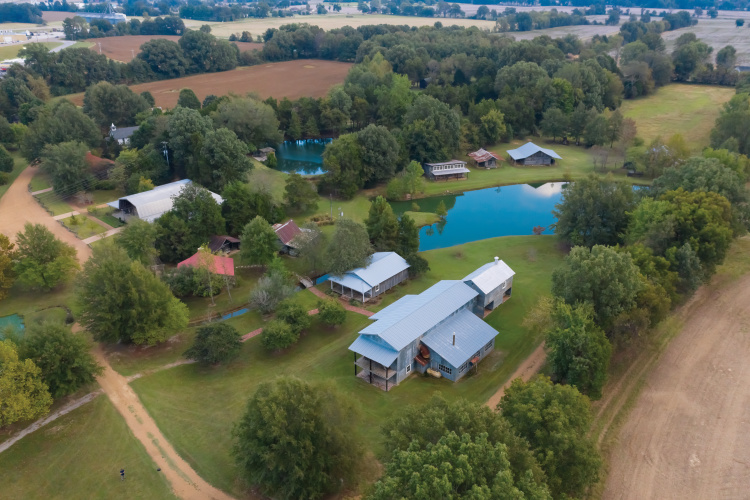
Photo credit: Jeff Adkins
From Hobby to Business
Spanning 30-plus acres adjoining the family farm, Freeman’s collection grew to more than 20 structures. “It spilled over and became what Green Frog Farm is now – a little antique Southern town,” he says. In naming the property, Freeman drew on the former name of the community, which was called Green Frog after the Green Frog Store opened there in the 1920s.
Freeman’s hobby was fulfilling but expensive – and he hadn’t found an effective way to monetize it. Luckily, his daughter, Krista Revelle, stepped in. “One day, Krista said I needed to think about how this was going to pay for itself,” Freeman says. “She said we needed to take the big barn, which is built around an antique mule barn, and turn it into an event center. We have a little chapel that was built in the late 1800s, so we have weddings in the church and events in the barn as a way to subsidize history.” The chapel and barn provide indoor space for ceremonies and receptions, while the gazebo and ponds make a picturesque backdrop for outdoor weddings and photos.
See more: Historic Collinsville Offers Visitors a Peek Into the Past
Green Frog Farm also draws revenue from its four bed-and-breakfast cabins, all between 100 and 180 years old. “One cabin was built in 1880, and one was built around 1840 by one of the first settlers to this area,” Freeman says. “We’re not exactly sure how old the other two are, but they’re over 100 years old.”
Only one cabin was structurally sound enough to be transported to the property intact from its original community of Walnut Hill, about 5 miles away. The others – from three communities in Henderson and Dickson counties – were dismantled log by log, with each piece numbered for reassembly in the correct order. Freeman has made every attempt to keep the integrity of the original cabins while also adding modern conveniences like bathrooms and kitchenettes.

Photo credit: Jeff Adkins
A Place to Unplug
Each cabin also has a wood-burning fireplace for use in colder weather. But television is one amenity that guests won’t find here. “This is a place where people come to unplug,” Revelle explains. “Our cabins don’t have TVs in them, and that’s purposeful, so that people feel like they’ve stepped back into an earlier era. Most of our guests really appreciate the time to just sit quietly and read a book and connect with each other without the distraction of TV.”
Outside of the cabins, guests pass the time at Green Frog Farm by taking self- guided tours of the cotton museum and historic structures. For three decades, the Freemans have cultivated blueberries and blackberries, which guests can pick in season. Amateur anglers enjoy catch-and-release fishing in the ponds. And there is plenty of beautiful scenery to take in, including an arboretum with over 100 tree varieties.
See more: Honest Abe Log Homes Makes Cabin Living a Reality
Located on U.S. 412 between the towns of Alamo and Bells, and roughly 14 miles northwest of I-40, Green Frog Farm is a favorite overnight stop for people visiting Tennessee Safari Park 2 miles away and for tourists road-tripping through the South’s musical heritage centers. “At times, we’ve had quite a few guests doing the Southern country and blues music tour, going from Nashville to Memphis to New Orleans,” Revelle says. “It’s surprising how many Europeans stay here because it’s on their route to tour those major music cities.”
Revelle enjoys highlighting the regional heritage on this quaint, peaceful farm. “My part is more aesthetic, but Dad has all the historical knowledge and can tell you how everything works,” she says. “He has created something really unique here.”
Location: 104 Green Frog Lane, Alamo, TN 38001 Phone: (731) 663-3319 (bed-and-breakfast/photography), (731) 571-8205 (weddings/events) Hours: By appointment only Website: greenfrogfarm.orgIf You Go
Green Frog Farm



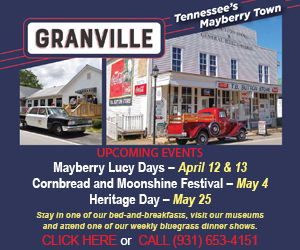
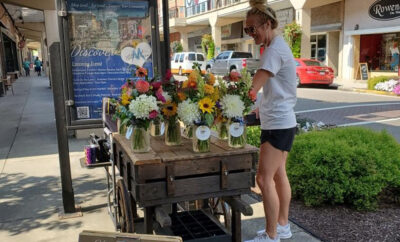
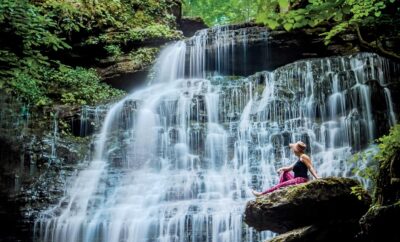
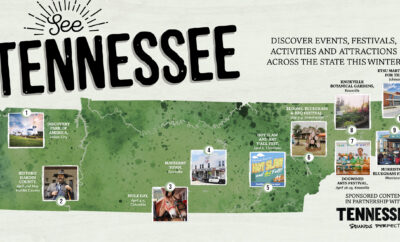
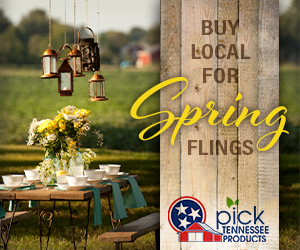






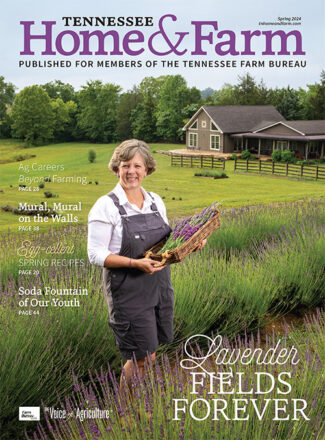

I have always loved Green Frog. My grandfather Grover Lee Buford and Joosie and my grandmother Beatrice Diggs and Jesse Diggs all had homes near there and my my great grandma Ms. Callie Buford.